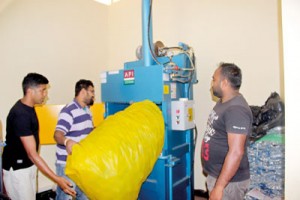News
Nuwara Eliya Municipal Council employs new garbage system
At a time when effective ways of managing garbage are being explored increasingly, the Nuwara Eliya Municipal Council (NEMC) has managed to put in place a comprehensive garbage management system. Only last month, a plastic and polythene recycling centre at the municipality’s sanitary landfill site at Sandathenna(Moon Plains) also commenced operations.

Plastic bottles being compressed at the centre
Spread over two hectares, the Moon Plains sanitary landfill was established in 2004 at a cost of Rs.17 million as a project funded by the Japan International Cooperation Agency (JICA). In July 2015, authorities also established a plastic and polythene recycling centre at the site.
The centre however, did not have electricity. It finally commenced operating on July 12, this year.
JICA conducted an assessment on the project which revealed that in a land area covering some 12.43 square kilometres in Nuwara Eliya, 25 out of 32 tonnes of garbage from 5,791 households, 3,520 businesses and 803 Government units are brought to the Moon Plains sanitary landfill. About 12 tonnes go towards making carbonic fertiliser.
Towards the end of 2015, the Nuwara Eliya Municipality also replaced its garbage carts with trucks and lorries.
In addition, the NEMC pasted 350 notices throughout the town informing residents about garbage management and the times that their garbage will be collected.
Within a span of about one and a half years, Nuwara Eliya residents have learned to hand over their garbage to tractors and lorries put in place to replace garbage carts.
D.B. Mavussawa, Chief Public Health Inspector (PHI) of the NEMC told the Sunday Times that 90 percent of people in Nuwara Eliya town were now segregating their garbage.
About two percent still don’t do so and this was a major problem, he maintained. “They continue to hand over unsegregated garbage to our lorries and we have to sort the garbage at the landfill site. As we have now started recycling plastic and polythene, we need to ensure that the item is clean when putting it in the recycling machine. This becomes a difficult exercise if garbage is unsegregated.”
He said the municipality’s garbage lorries and trucks have stopped accepting unsegregated garbage and have started collecting general waste, plastic and polythene separately.
Nuwara Eliya Municipal Commissioner Ruwan Ratnayake said while the Municipality’s garbage management program has earned widespread recognition, it was still far from perfect. Some Government institutions are still expressing reluctance to segregate their garbage, he alleged. “However, we are firm in our stance not to accept unsegregated garbage. When the entire country is adopting one approach, it is our duty to fall in line,” he pointed out.

Plastic bottles being collected at the centre

The plastic and polythene recycling centre

